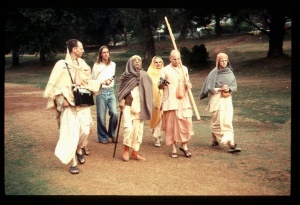CC Adi 17.28 (1975)

A.C. Bhaktivedanta Swami Prabhupada
Below is the 1996 edition text, ready to be substituted with the 1975 one using the compile form.
TEXT 28
- kāṭileha taru yena kichu nā bolaya
- śukāiyā mare, tabu jala nā māgaya
SYNONYMS
kāṭileha—even being cut; taru—the tree; yena—as; kichu—something; nā—not; bolaya—says; śukāiyā—drying up; mare—dies; tabu—still; jala—water; nā—does not; māgaya—ask for.
TRANSLATION
“For even if one cuts a tree, it never protests, and even if it is drying up and dying, it does not ask anyone for water.
PURPORT
This practice of forbearance (taror iva sahiṣṇunā) is very difficult, but when one actually engages in chanting the Hare Kṛṣṇa mantra, the quality of forbearance automatically develops. A person advanced in spiritual consciousness through the chanting of the Hare Kṛṣṇa mantra need not practice to develop it separately, for a devotee develops all good qualities simply by chanting the Hare Kṛṣṇa mantra regularly.